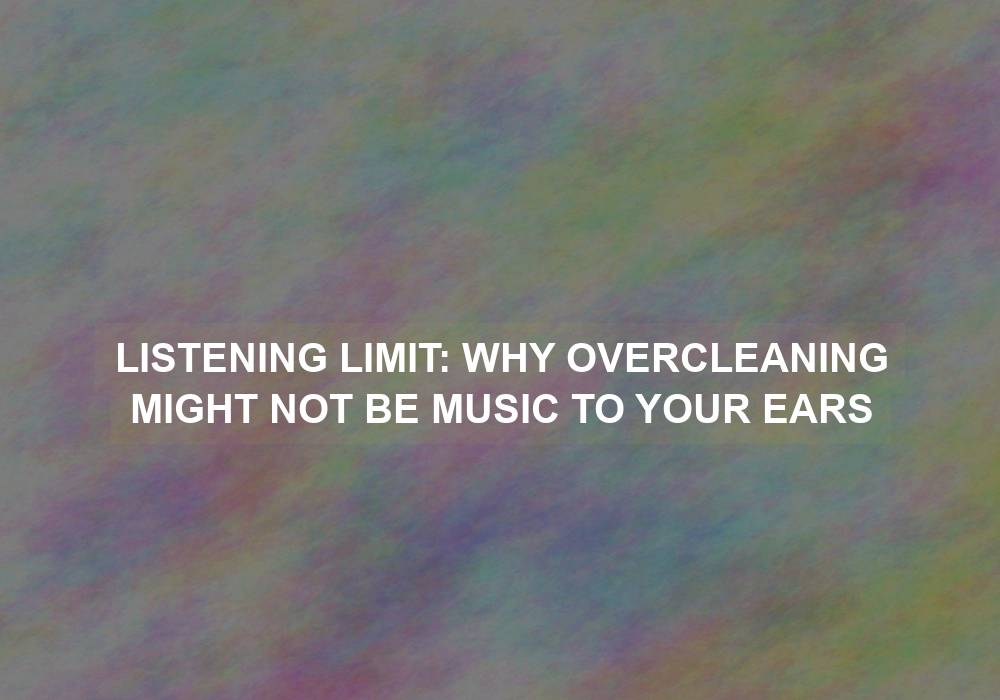Maintaining proper hygiene is essential in our daily lives, and this includes ensuring the cleanliness of our surroundings. When it comes to our ears, there is a common misconception that overcleaning is beneficial. However, it is important to be aware that overcleaning your ears can actually have negative consequences. In this article, we will explore the reasons why overcleaning might not be music to your ears.
Understanding the Ear’s Natural Cleaning Process
Before delving into the potential harms of overcleaning, it is crucial to understand how the ear naturally cleans itself. Our ears are designed to self-clean through a natural process involving the production of earwax, also known as cerumen.
Earwax acts as a protective barrier, trapping dust, debris, and foreign particles, preventing them from reaching the delicate parts of the ear. This natural cleaning process is essential for maintaining the health of our ears. It helps to lubricate and moisturize the ear canal, preventing dryness and irritation.
The Dangers of Overcleaning
-
Disruption of the Ear’s Natural Balance: Overcleaning can strip away the earwax, disrupting the natural balance within the ear. Earwax plays a crucial role in maintaining the pH balance and preventing the growth of harmful bacteria and fungi. Excessive removal of earwax can leave the ear canal dry and vulnerable, leading to discomfort and potential infections.
-
Increased Risk of Infections: Overcleaning can also increase the risk of infections. When the ear canal is left dry and unprotected, it becomes more susceptible to bacterial or fungal growth. This can result in painful ear infections, causing symptoms such as pain, itching, discharge, and even temporary hearing loss. It is important to note that the ear canal has a self-cleaning mechanism that helps to expel excess earwax and keep the ear clean naturally.
-
Potential Damage to the Ear Canal: Inserting objects such as cotton swabs, bobby pins, or pointed tools into the ear canal to clean it can lead to accidental injury. These objects can cause scratches, punctures, or even trauma to the delicate structures within the ear, including the eardrum. The ear canal is delicate and sensitive, and any damage to its structure can result in pain, infection, or even permanent hearing loss.
-
Earwax Impaction: Overcleaning can inadvertently push earwax deeper into the ear canal, leading to a condition called earwax impaction. Earwax impaction occurs when earwax accumulates and becomes tightly packed, causing discomfort, hearing loss, and a feeling of fullness in the ear. This can also increase the risk of developing infections or other complications.
Proper Ear Cleaning Practices
While it is important to avoid overcleaning, it is equally important to maintain proper ear hygiene. Here are some recommended practices for keeping your ears clean and healthy:
1. Leave the Earwax Alone
The first step is to resist the temptation to remove earwax unnecessarily. Remember that earwax is beneficial and serves a protective purpose. Let your ears naturally expel excess earwax. If you notice excessive earwax buildup or experience discomfort, it is best to consult a healthcare professional for guidance.
2. Clean the Outer Ear Only
When cleaning your ears, focus on the outer part only. Use a warm, damp cloth to gently wipe away any visible dirt or debris from the earlobe and the external ear canal. Avoid inserting anything into the ear canal, as this can do more harm than good. The ear canal has a self-cleaning mechanism that helps to remove excess earwax naturally.
3. Seek Professional Help
If you experience symptoms such as persistent ear discomfort, itching, or hearing loss, it is important to consult a healthcare professional or an ear specialist. They can assess your condition and provide appropriate guidance or treatment, if necessary. A professional examination can help identify any underlying issues and prevent potential complications.
Conclusion
In conclusion, overcleaning your ears can have detrimental effects on your aural health. By understanding the ear’s natural cleaning process and the potential dangers of overcleaning, you can take the necessary steps to maintain proper ear hygiene. Remember, it is best to let your ears do their job and seek professional help if you have any concerns. By doing so, you can ensure that your ears remain healthy and your listening experience remains pleasant.
